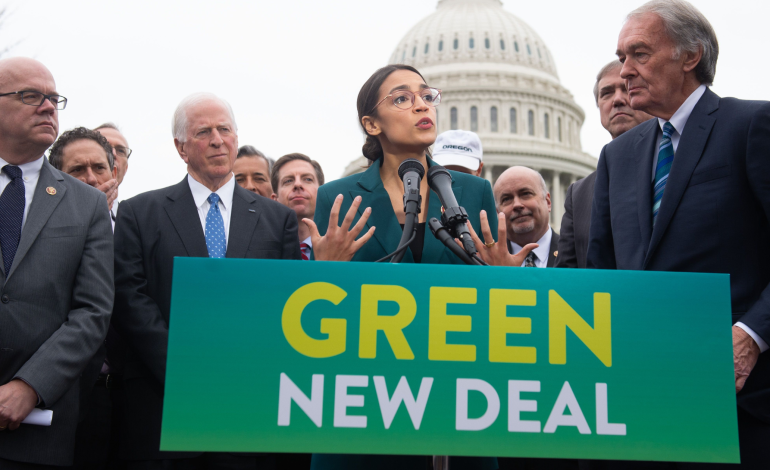
The Green New Deal: Transforming Policy for Climate Action and Economic Justice
Introduction
A paradigm shift in policy is necessary in light of the growing economic inequities and climate challenges. Emerging as a daring and revolutionary paradigm, the Green New Deal (GND) seeks to mitigate climate change while tackling social and economic inequities. It represents a vision of a sustainable future where social justice and environmental stewardship are crucial, and it was born out of necessity. This blog examines the main points, objectives, disputes, and possible effects of the Green New Deal, shedding light on how it has influenced global policy discourse.
Understanding the Green New Deal
The phrase “Green New Deal” is derived from the New Deal of the 1930s, a set of revolutionary laws passed in the US to fight the Great Depression. While the New Deal’s main objective was economic recovery, the Green New Deal incorporated environmental sustainability as one of its main principles. The Green New Deal (GND), which has been proposed by politicians like Alexandria Ocasio-Cortez and backed by grassroots movements like the Sunrise Movement, consists of a wide range of policies covering the energy, infrastructure, social welfare, and employment sectors.
Goals of the Green New Deal
- Climate Action: By switching to renewable energy sources, cutting greenhouse gas emissions, and encouraging sustainable practices, the GND aims to attenuate climate change. This means implementing strict environmental legislation, investing in clean energy infrastructure, and gradually phase-out of fossil fuels.
- Economic Justice: The GND seeks to alleviate economic inequities through social welfare programs, fair resource distribution, and employment creation, acknowledging the interdependence of environmental and social issues. By giving priority to underprivileged communities that are disproportionately impacted by environmental deterioration, it aims to promote equitable growth and prosperity.
- Sustainable Development: The GND promotes a comprehensive strategy for development that strikes a balance between ecological integrity and economic growth. It asks for spending on environmentally friendly technologies, conservation initiatives, and robust infrastructure to guarantee sustainability over the long run and adaptability to changing environmental conditions.
Controversies Surrounding the Green New Deal:
The Green New Deal has encountered strong resistance and criticism despite its admirable goals, especially from conservative lawmakers, business lobbyists, and doubters. Several of the major disputes are as follows:
- Cost Concerns: Opponents claim that putting the GND into effect would be extremely expensive and burden taxpayers with unmanageable debt. They doubt that lofty goals like cheap housing, universal healthcare, and subsidies for green energy can be funded without placing a heavy financial strain on society.
- Economic Disruption: Detractors point out that shifting away from fossil fuels would upend current industries, resulting in job losses and adverse effects on the economy. They highlight the possible difficulties in retraining laborers, boosting rural economies, and making sure that populations dependent on extractive industries have a fair transition.
- Ideological Divide: The GND has emerged as a central topic of discussion in ideological discussions, with supporters presenting it as a progressive response to structural inequalities and opponents characterizing it as a socialist program endangering the fundamentals of free markets. Bipartisan agreement has been hampered by this ideological polarisation, which has also impeded substantive discussion on climate policy.
- Feasibility and Implementation: Detractors point to regulatory obstacles, technological constraints, and political viability as reasons for doubting the GND’s recommendations’ usefulness and efficacy. They contend that practical solutions catered to various settings and stakeholder interests are necessary to achieve social fairness and carbon neutrality.
Impacts and Potential of the Green New Deal:
Notwithstanding its difficulties and criticisms, the Green New Deal has sparked a global dialogue about economic justice and climate action, encouraging activists, politicians, and ordinary people to reassess their priorities and welcome revolutionary change. Among its possible effects are:
- Mobilising Public Support: The GND has revealed a growing need for decisive action to address the climate issue by igniting grassroots movements and mobilizing public support for ambitious climate policies. The political agenda’s elevation of environmental challenges has increased public awareness of the necessity of taking action as a group.
- Modifying Policy Discourse: As a result of the GND, governments all over the world are now obliged to reevaluate their environmental commitments and set more aggressive climate targets. Its focus on social justice and intersectionality has expanded the purview of environmental policymaking and encouraged cross-sector collaboration and interdisciplinary methods.
- Promoting Investment and Innovation: The GND’s focus on green technologies, sustainable infrastructure, and renewable energy has encouraged investment and innovation in clean energy solutions. It has made new avenues for employment creation, economic expansion, and technical improvement possible by offering incentives for private sector participation and public-private partnerships.
- Fostering International Cooperation: The GND emphasizes the necessity of global collective action and the interconnectedness of environmental issues by calling for international cooperation and solidarity. It opens the door for cooperative solutions to global problems like climate change and environmental degradation by encouraging communication, information exchange, and international support.
Conclusion
In order to address the interlocking crises of social injustice, economic inequality, and climate change, the Green New Deal offers a revolutionary vision. It represents a daring and inclusive approach to policymaking that puts human well-being, economic justice, and environmental sustainability first, despite criticism and challenges. In the face of the pressing demands of the twenty-first century, the GND acts as a ray of hope and a force for good, encouraging us to reconsider how we relate to the environment and to one another. We have the chance to create a future for future generations that is more resilient, fair, and sustainable by adopting its ideals and goals.





